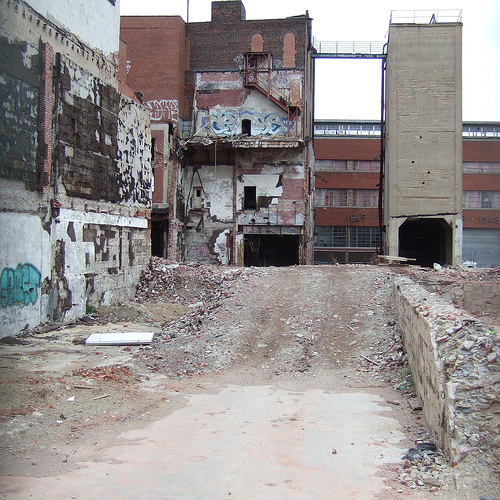
The concept of degrading has a different emphasis in the world of technology. When we talk about degrading in the physical world, it is always in the sense of prevention. We stop things from degrading, we attempt to slow the forces of entropy – even if it means replacing the old with the new.
In the world of technology, to gracefully degrade means to cope with unexpected failures or unintended limitations. A program, for example whose video routines degrade gracefully will first try the highest resolution, then the next lowest, and so on. The content displayed will be as good as possible given the limitations of the monitor. Analog TV signals – with small amounts of static and ghosting – also degrade gracefully.
Digital TV does not. If you’ve made the switch (and use and antenna), the artifacts from a degraded signal can suddenly and sharply make a program unwatchable. This kind of degrading – where the system suddenly and completely fails – is both common and underexamined in our society. If anything, we’re prone to designing so-called elegantly degrading systems – where the appearance of normalcy is maintained even as the system tears itself to shreds.
 The conversations in my area have been interesting the last few days. The power’s been out – windstorms blown out from Ike took out power in a wide swath through southwest Ohio. There are those people who have coped by replacing the grid – running generators and the like. There are those people who have coped halfway decently – grilling, having passive insulators for food, or switching quickly to nonperishables (or at least non-refrigerated food). And then there were the people who were at a loss without power – who simply did not know what to do with themselves without modern powered luxuries.
The conversations in my area have been interesting the last few days. The power’s been out – windstorms blown out from Ike took out power in a wide swath through southwest Ohio. There are those people who have coped by replacing the grid – running generators and the like. There are those people who have coped halfway decently – grilling, having passive insulators for food, or switching quickly to nonperishables (or at least non-refrigerated food). And then there were the people who were at a loss without power – who simply did not know what to do with themselves without modern powered luxuries.
The first group (those with generators) are essentially the third group (those who can’t cope), but with a hidden stash. Once the gas for their generators ran out, they’d crash just as hard.
Parts of my region will be without power until Thursday. In some places, gasoline is hard to find. And this was just a single windstorm – an isolated incident.
 When the lights were out, nighttime made it obvious how much light we put out on a regular basis. When the lights were out, it drove home *viscerally* how much we depend on cheap, available energy.
When the lights were out, nighttime made it obvious how much light we put out on a regular basis. When the lights were out, it drove home *viscerally* how much we depend on cheap, available energy.
When the lights were out, we got a warning that we need to plan. We have plans for our society to “tide us over” – generators and the like – to deal with short-term power outages. We do not have plans to degrade gracefully – as a society or as individuals – and that should worry us.
If you’ll excuse me, I’m going to get two sticks. I think I want to start a fire.
